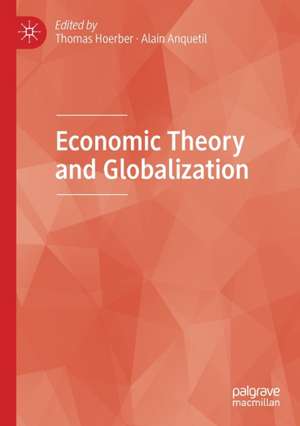Economic Theory and Globalization
Editat de Thomas Hoerber, Alain Anquetilen Limba Engleză Paperback – 4 sep 2020
Each economic theory is presented for easy access, readability and simplicity; explaining the criticism a particular theory poses against its own contemporary environment, such as the poverty produced by Manchester capitalism in Marx, and then applying those historical lessons to our current time. Should some economic theories be left sitting on a shelf, safely without any impact on us, or do some great economic ideas still have something to contribute to the grand quest for a more just society in its many interpretations?
| Toate formatele și edițiile | Preț | Express |
|---|---|---|
| Paperback (1) | 582.12 lei 6-8 săpt. | |
| Springer International Publishing – 4 sep 2020 | 582.12 lei 6-8 săpt. | |
| Hardback (1) | 783.50 lei 6-8 săpt. | |
| Springer International Publishing – 4 sep 2019 | 783.50 lei 6-8 săpt. |
Preț: 582.12 lei
Preț vechi: 684.84 lei
-15% Nou
Puncte Express: 873
Preț estimativ în valută:
111.39€ • 121.37$ • 93.86£
111.39€ • 121.37$ • 93.86£
Carte tipărită la comandă
Livrare economică 23 aprilie-07 mai
Preluare comenzi: 021 569.72.76
Specificații
ISBN-13: 9783030238261
ISBN-10: 3030238261
Pagini: 262
Ilustrații: XV, 262 p. 3 illus., 1 illus. in color.
Dimensiuni: 148 x 210 mm
Greutate: 0.37 kg
Ediția:1st ed. 2019
Editura: Springer International Publishing
Colecția Palgrave Macmillan
Locul publicării:Cham, Switzerland
ISBN-10: 3030238261
Pagini: 262
Ilustrații: XV, 262 p. 3 illus., 1 illus. in color.
Dimensiuni: 148 x 210 mm
Greutate: 0.37 kg
Ediția:1st ed. 2019
Editura: Springer International Publishing
Colecția Palgrave Macmillan
Locul publicării:Cham, Switzerland
Cuprins
Chapter 1: Introduction; Thomas Hoerber, Alain Anquetil.- Chapter 2: The Social Liberalism of John Stuart Mill; Alain Anquetil.- Chapter 3: Karl Marx’s Communism and Critique of Capital; Paul Prew.- Chapter 4: Edmund Burke’s Liberalism; Thomas Hoerber.- Chapter 5: The free Liberalism of Adam Smith; Alain Anquetil.- Chapter 6: Economic Cycles by Josef Schumpeter; Assen Slim.- Chapter 7: The Bancor and International Trade Possibilities of John Maynard; David Rees.- Chapter 8: The roots of neo-liberalism in Friedrich von Hayek; Thomas Hoerber.- Chapter 9: Elinor Ostrom or the Revolution of the Commons; Fanny Verrax.- Chapter 10: The Ecological Economy of Georgescu Roegen; Gabriel Weber, Ignazio Cabras.- Chapter 11: Conclusion; Alain Anquetil, Thomas Hoerber.
Notă biografică
Thomas Hoerber is Director of the EU-Asia Institute and Professor in European Studies at Ecole Supérieure des Sciences Commerciales d'Angers (ESSCA), France. His research focuses on European integration theory, with a particular interest in the connection between History and Politics.
Alain Anquetil is Professor of Moral Philosophy and Business Ethics at Ecole Supérieure des Sciences Commerciales d'Angers (ESSCA), France.
Alain Anquetil is Professor of Moral Philosophy and Business Ethics at Ecole Supérieure des Sciences Commerciales d'Angers (ESSCA), France.
Textul de pe ultima copertă
What do the economic theories of thought-leaders in economics, such as Smith, Keynes, Marx and Schumpeter, tell us about globalisation in the twenty-first century? Great economic theories have provided a narrative of how society should work in all its aspects, and can offer renewed usefulness for today's society.
Each economic theory is presented for easy access, readability and simplicity; explaining the criticism a particular theory poses against its own contemporary environment, such as the poverty produced by Manchester capitalism in Marx, and then applying those historical lessons to our current time. Should some economic theories be left sitting on a shelf, safely without any impact on us, or do some great economic ideas still have something to contribute to the grand quest for a more just society in its many interpretations?
Each economic theory is presented for easy access, readability and simplicity; explaining the criticism a particular theory poses against its own contemporary environment, such as the poverty produced by Manchester capitalism in Marx, and then applying those historical lessons to our current time. Should some economic theories be left sitting on a shelf, safely without any impact on us, or do some great economic ideas still have something to contribute to the grand quest for a more just society in its many interpretations?
Caracteristici
Takes a lighter approach to economic theories, providing historical background and easy access to understand their relevance for modern society Analyses the creator of an economic theory in their historical context Highlights the connections of economic theories to globalisation
